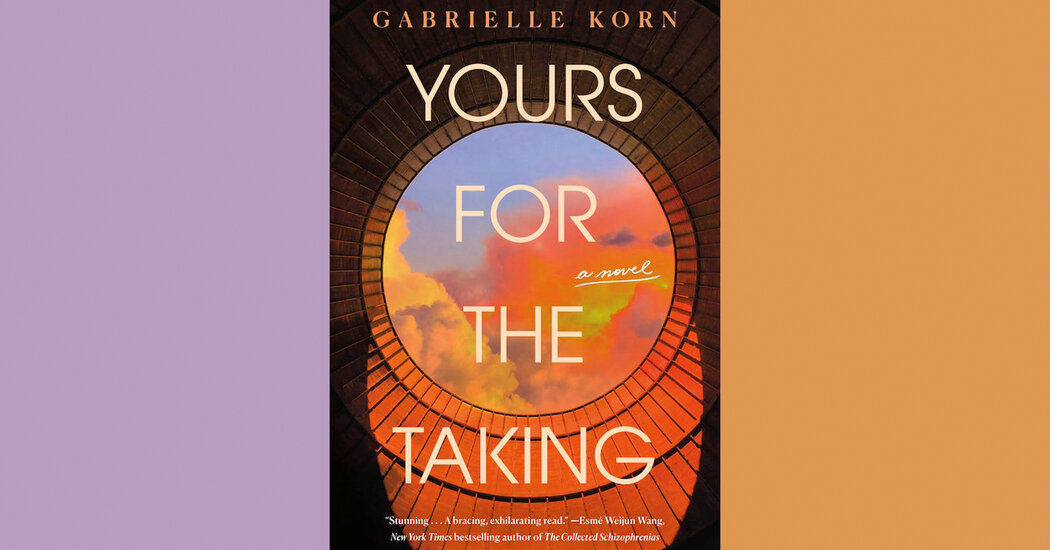
In Gabrielle Korn’s debut novel, “Yours for the Taking,” a feminist cultural icon runs a lifesaving artificial habitat, but a secret, and controversial, agenda guides her project.
YOURS FOR THE TAKING, by Gabrielle Korn
“Yours for the Taking” follows an ensemble cast in a dystopian, near-future world where climate change and capitalism have rendered Earth toxic. The ultrarich have fled to luxury shuttles in outer space. Back on the planet, an enterprise called the Inside Project is creating sealed habitats on top of cities, designed to shield humanity from the climate’s dangers. Each “Inside” is funded and designed by a different corporate sponsor, but there isn’t enough room for everyone who seeks refuge.
Korn’s novel focuses on the Inside built over New York City, bankrolled by Jacqueline Millender, a white cis woman, feminist, multibillionaire and cultural icon known for creating Instagrammable women’s clubs (reminiscent of the Wing) and writing books about her rise to power (reminiscent of Sheryl Sandberg’s “Lean In”). But Millender has a secret agenda for her Inside: Only women will be allowed. And the accepted residents won’t know this until they’ve arrived and been locked in.
What does Millender mean by “women,” though? She’s unconvinced trans women should be allowed in her “women only” Inside. She’s also unsure about trans men and nonbinary folks and, really, anyone who isn’t a cis woman. Millender’s logic for defining “womanhood” will leave the reader queasy, but applauding Korn’s satire of TERF rhetoric. At its core, this novel is an exploration of the violence of white, trans-exclusionary radical feminism.
A plot recalling “Brave New World” props up the book’s commentary. The characters who gain entry to Millender’s Inside discover a steep price for their safety: They are drugged, brainwashed and coerced into carrying and raising a new generation of children, all in service of yet another of Millender’s secret goals. The drama of the novel comes from watching the characters be changed and challenged as they try to survive in Millender’s warped dollhouse.
The action of the book will keep the reader turning the pages, but it does not compensate for the characters’ lack of complexity. Millender is an entertaining parody of white feminism, but she crumples into a one-dimensional villain as the book goes on. The characters orbiting her fare even worse. The book also follows Ava, a queer, upper-middle-class white cis woman who is accepted to the New York Inside; her ex-girlfriend Orchid, a working-class white cis woman who is rejected for residency; Olympia, a Black, queer cis woman and medical doctor pressured into running Millender’s Inside; Shelby, a white trans woman who becomes Millender’s devoted employee; and Brook and July, Ava’s children, young cis girls of Generation A who were born in Inside.
If these descriptions seem overly concerned with identity signifiers, that’s because the book is deeply concerned with identity. We are meant to see the tension between Millender’s white feminist ideals and the realities of the Black, trans and working-class lives of the people forced to live in her world. But it is hard to get excited about Korn’s representative efforts when her characterization of those lives doesn’t go deep. The characters of diverse backgrounds are frequently sidelined, ushered offstage by a variety of plot developments, only to return at the 11th hour to facilitate a rainbow coalition denouement. These characters feel hemmed in, allowed to speak only when conveniently performing ideological functions. Despite aiming to critique exclusionary feminism, Korn struggles to extend ample page time and complexity to marginalized identities — to offer them true narrative inclusion.
Is it possible to dismantle white feminism from the inside or “the Inside”? At the action-packed end of this book, the characters make big moves and Korn seems to suggest it is. (The ending sets up a sequel, which is in the works.)
Queer writers and writers of color have long been publishing science fiction that radically reimagines the world and challenges our ideas for living in it. Think of Octavia Butler, Ryka Aoki, Samuel Delany, Rivers Solomon and N.K. Jemisin. “Yours for the Taking” is an effective scale model of the white feminism we already know, and there’s value in this, even if Korn’s world building isn’t as ambitiously radical as that of her literary antecedents. Still, despite its hopeful ending, this novel’s shortcomings remind the reader that we’re not red-pilling our way out of the matrix of exclusionary feminisms anytime soon.
YOURS FOR THE TAKING | By Gabrielle Korn | St. Martin’s | 322 pp. | $29
